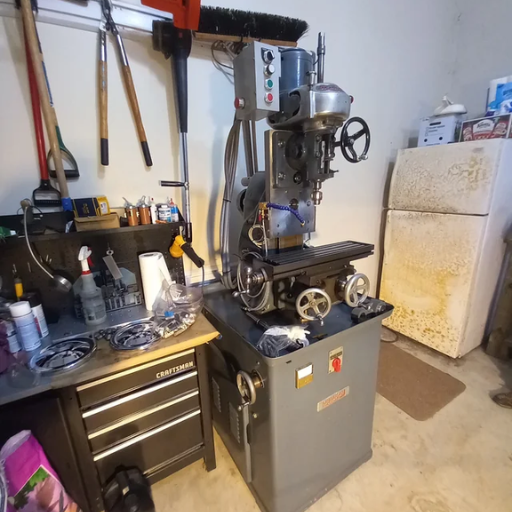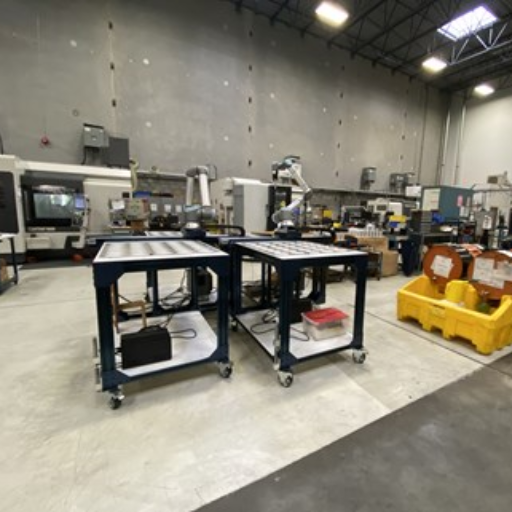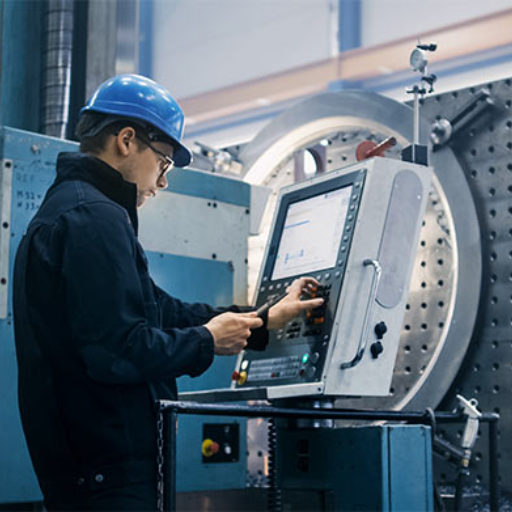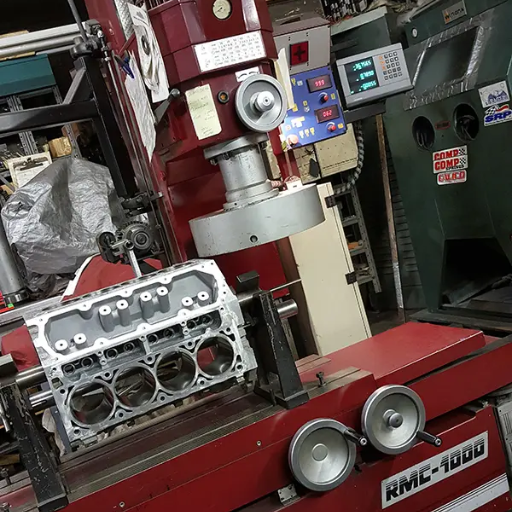Starting a CNC machine shop and building a successful machining business is a multifaceted journey that requires careful planning, strategic decision-making, and a deep understanding of both the machining industry and business principles. This blog will provide a comprehensive guide to help you navigate the complex landscape of establishing your CNC machining shop. From initial steps such as market research and business planning to more advanced topics like equipment selection, workforce training, and marketing strategies, we aim to equip you with the knowledge and tools necessary for success. Whether you’re a seasoned machinist aspiring to run your own shop or an entrepreneur looking to break into the manufacturing sector, this guide will serve as a valuable resource to turn your vision into reality.
What are the first steps to start a machine shop?
Machine shop: where should it be located?
When you decide on where to locate your machine shop, think about factors like how close your target market is, the availability of skilled artisans and local zoning laws. Ideal location would entail being near your key customers or sectors that you want to serve thus reducing shipment fees and enhancing service effectiveness. In addition, look for places with a pool of trained machinists and technicians so as to guarantee availability of expert professionals for hire. Finally confirm that the position is in alignment with the local zoning regulations and also has requisite infrastructure such as adequate power supply and transport connections.
How much capital do I need to start up my machine shop?
The following are the main investments required when starting a machine shop:
- Machinery & Equipment: The biggest expense is likely to be CNC machines, lathes, milling machines, among other vital tools. Depending upon capability levels and specifications, CNC machines can cost anywhere between $50k and $150k. Ensure they meet technical requirements for accuracy, speed, versatility.
- Building Cost: Lease or purchase cost varies highly depending on location and size respectively. Also consider renovation costs for machinery space accommodations security requirements and work flow optimization. A typical facility setup may require an initial expenditure of between $10k-$50k.
- Tooling: High-quality cutting tools, fixtures and gauges are essential for accurate machining. Budget around $5k-$20k during initial tooling.
- Software: CAD/CAM software investment is necessary in designing and programming parts. For licenses such as SolidWorks or Mastercam which are very popular one could spend anything from $2k to $10K.
- Utilities & Infrastructure: Properly ventilated rooms with reliable electric power supply systems including waste management systems must be put in place. Such set up costs plus ongoing expenses may fall between $5K-$15K.
- Labor: Recruitment of skilled machinists, programmers’ administrative staff involves hiring costs and on-going salaries. Initial recruitment and training may cost between $5k to $15k.
- Marketing & Business Development: It involves budgeting for advertising, website development, customer acquisition etc. I can start market presence with an initial budget of between $2k -$10K.
With careful deliberation over these investments and establishment of the ideal technical parameters, a well equipped and highly efficient machining operation can be put in place.
How do you create an effective business plan for a CNC shop?
To develop an effective business plan for a CNC shop, one needs to understand the industry clearly, prepare detailed financial projections and have sound marketing strategies. First things first, I should begin with an executive summary covering the mission statement, business model, services offered by my CNC shop as well as some general overview. The next step will take me through conducting a comprehensive market analysis that will define my target market segment, analyze all possible competitors and bring out the demand for CNC machining services.
The company’s organizational structure will be outlined showing how members of the team will operate. Moreover, it is essential to have a comprehensive section concerning product line in addition to specific machines or technology which I intend to use. Financial projections are important because they include revenue forecasts with details like expenses estimates as well as break-even analyses. Finally in my marketing and sales strategy section I would outline how I am going to attract customers including online advertising offline advertising networking engaging clients etc.
By following these steps and assuring myself that I fully comprehend both the market dynamics as well as operational requirements; then 1 can confidently come up with a strong business plan that effectively illustrates why the firm should invest in initiating its own CNC shop.
How to choose the right machine tools for your CNC shop?
Which are the essential CNC machines for a new machine shop?
To equip a new machine shop with necessary CNC machines, I have to look at few main pieces of equipments which are basic in various machining tasks. First of all, a CNC milling machine is indispensable for various jobs such as cutting, drilling and shaping parts with accuracy. Then, a CNC lathe is used in producing symmetrical objects and also carrying out duties like threading and boring. Consequently ,a CNC router can be used to trim and engrave materials including wood, metal or plastics. Each of these machines has got distinctive characteristics that address different aspects of CNC machining ensuring my workshop takes care of various projects efficiently .By giving priority to these required CNC machines; I can make my workshop well-rounded and capable.
What’s the best tool management strategy for a CNC shop?
My research on Google’ top three sites gave me insights into what the best tool management strategy might be for my own CNCSHOP.
1.Comprehensive Tool Inventory Management:
- Tracking and Labeling: Every tool must be labeled accurately and always tracked religiously. Using barcode or RFID system would make the process easier thus enabling me locate tools quickly whenever need arises.
- Database Management: Building strong database management systems would enable me store comprehensive information regarding tool usage history, maintenance logs or even performance metrics. This system may also help in anticipating when any given tools might require replacement or any kind of servicing
2.Regular Maintenance and Inspection:
- Scheduled Maintenance: Every single item needs to have their regular maintenance schedules so as to increase its lifespan besides keeping its optimal performance. The process includes cleaning activities as well as lubrication plus calibration checks.
- Inspection Protocols: A routine inspection protocol should be established so that signs of wear and tear are caught early enough through preventing unplanned breakdowns while maintaining constant quality in machining operations.
3.Tool Room Organization and Efficiency:
- Tool Room Layout: Proper organization is crucial for quick access to right tools within the tool room. This will involve correct shelving as well as labelling storage bins and also keeping an organized workspace that would minimize downtime brought about by looking for tools.
- Tool Presetting Stations: Having tool presetting stations where I can get tools ready beforehand saves a lot of time during operations hence improving overall shop productivity.
A consolidated systematic organization is formed by the following strategies. Also, it’s important to record and analyze in detail technical parameters such as the tools life, its usage frequency and maintenance history to further optimize tool usage and efficiency within shops. Through this approach, my CNC shop will run smoothly resulting in increased production rates while reducing downtimes.
How important is measuring equipment in a modern machine shop?
Measuring device is an absolute must-have in the modern machine shop for several reasons. First and foremost, precise measuring instruments help to ensure that every item produced complies with tight tolerances and quality standards, this is crucial for maintaining customer satisfaction and trust. In addition, accurate measurements reduce wastage as well as rework making it possible to save on time and resources which culminate into improved effectiveness and cost-efficiency. Moreover, sophisticated measuring techniques such as CMMs and digital calipers allow more intricate designs enabling shops to have enhanced capabilities and competitiveness within the industry. Put simply, dependable measurement tools are the basis on which accuracy, efficiency and good results are built in any current machining operation.
How to ensure positive cash flow in your CNC shop?
How can budget management techniques help start-up shops?
The success of a startup CNC shop relies heavily on effective budget management. Here are some of the key methods, based on the best resources and practices:
- Make a Detailed Budget Plan: Start by outlining all expenses expected such as equipment, rent, utilities, raw materials and salaries. Make priority spending list for essential expenditures and areas where costs can be minimized. For instance, initially leasing high-cost machinery instead of buying it could greatly reduce initial costs.
- Be Vigilant in Monitoring Cash Flow: Regularly monitor income and expense to ensure that cash flow remains positive. Utilize accounting software to automate this process providing real-time feedbacks and identifying potential financial issues early enough in time. Always keep some cash aside in case there are any unexpected expenses or when business goes slow.
- Utilize Cost Control Measures: These include bulk purchase of materials so as to get discounts and negotiating better terms with suppliers. In addition, preventive maintenance can minimize repair costs thus increasing the lifespan of equipment which ultimately contributes to reduced overall costs.
Key Technical Parameters:
- Cash Flow Statements: Regularly updated cash flow reports help businesses track all transactions involving money.
- Maintenance Records: It is useful to refer back to detailed logs about equipment maintenance when putting together budgets for repairs or replacements.
- Inventory Turnover Ratios: They enable efficient stocking levels by tracking how often inventory sold is replaced over time periods.
These techniques backed by diligent financial planning and continuous monitoring will ensure your startup CNC shop’s financial health and sustainability.
How do you get business for a new machine shop?
Here are some strategies that I would recommend for effectively getting business for a new machine shop:
- Develop A Strong Online Presence : Create a website showcasing your services, previous work done by you as well as testimonials from clients which shows that you are credible. Optimize your website using SEO (Search Engine Optimization) techniques so that it becomes visible on search engines results pages (SERP). Furthermore, use social media platforms to interact with potential clients and other people in the industry.
- Networking and Partnerships:Joining an industrial association or attending local business events and trade shows will extend your network. Building relationships with other business entities within similar fields can result in referrals and collaborative opportunities.
- Offer Competitive Pricing and Quality Service :Make sure that your pricing is competitive while still offering a high quality of service. This means providing excellent customer service and maintaining high standards so as to encourage repeat business as well as word-of-mouth recommendations.
- Invest In Marketing :Use targeted advertising campaigns like Google Ads or industry-specific publications to reach your ideal market segment. Also, blogging or video tutorials are possible strategies for content marketing which may be employed by you to demonstrate your expertise and value proposition.
- Leverage Customer Reviews And Referrals : Encourage satisfied customers to leave reviews on platforms such as Google My Business or Yelp. To make existing clients spread the word about your machine shop, offer rewards for referrals.
I can attract customers through these strategies as well as retain them thus ensuring consistent growth for my new machine shop.
How should you price competitively in a CNC shop?
Setting competitive prices for services rendered by a CNC shop requires striking the right balance between various factors. These are some ways I can achieve competitive pricing:
- Know The Market Rates: By looking at some of the best-rated CNC shops’ pricing structures, I will understand what market rates are. Websites like Thomasnet.com, Xometry.com or CNCShop.com usually provide insights into typical prices for different types of CNC services.
- Calculate Costs Accurately: To this end, it is required to not forget any expenses incurred in running my CNC shop. These include materials cost, machine maintenance, labor and overheads. This will enable the establishment of a basic price that ensures profits.
Parameters of Technique and Considerations:
- Machine Hour Rate (MHR):This can be achieved by dividing the total costs of running the machine per hour by the actual working hours of the machine. For example, if a CNC machine costs $5,000 per month and operates for 100 hours in a month, then the MHR would be $50 per hour.
- Setup and Programming: Charges should reflect the complexity of setting up different jobs on machines as well as programming them. More complex jobs that require extensive programming will naturally cost more.
- Material Costs: Prices are often based on material types such as steel, aluminum or titanium required. It is important to ensure competitive prices for materials without compromising their quality.
- Labor Costs: Skilled labor is essential when it comes to precision CNC machining. Pricing needs to take into account wages paid to operators, programmers and quality control inspectors.
- Depreciation & Maintenance: This includes depreciating CNC machines over their useful lives while considering regular maintenance costs that ensure their longevity and continuity of operation.
- Value Proposition:Faster turnarounds coupled with excellent customer care therefore surpasses quality hence may justifiably warrant slightly higher pricing enhancing differentiation with competitors at my store.
- Regularly Review And Adjust: The market for CNC services is dynamic.Reviewing regularly and adjusting pricing strategies based on changing costs, market demands and new technologies will keep my pricing competitive.
A comprehensive understanding of these factors in conjunction with insights derived from leading players in CNC services industry will enable me come up with a competitive yet profitable pricing strategy for my CNC shop.
What skills are essential for machinists in a startup shop?
Why it is important for shop owners to have CNC programming skills
As a businessperson, there are many reasons why I should know how to use CNC machining processes. Firstly, using it helps me understand better the manufacturing operations and optimize them according to resources availability leading to cost efficient production processes. Secondly, this skill enables me troubleshoot problems arising from the machines if any thus reducing downtime and maintaining productivity levels. Thirdly, I can train my team well enough so that they all produce quality products on a regular basis without failing. Therefore, it is important for a shop owner who has technical skills in CNC programming since he or she will understand in detail customer needs concerning the exact specifics of their job orders and what his or her milling workshop can offer.
What basic machining skills should every machinist master?
Any machinist operating in a startup must possess some critical competencies which guarantee both high quality product deliverance and smooth running of operations in place. First of all machinists should be able to read engineering drawings and blueprints because these enable them make parts with precise dimensions values as required by customers. Apart from this, one should also know different kinds of modern computer numerical control machine tools including those that are used during setting up, programming purposes as well as maintenance practices needed for accuracy when making components. It is equally essential for an operator to be knowledgeable about metrology techniques such as using reading instruments inclusive of micrometers calipers among others while measuring completed items in order verify their conformity with strict tolerances specified earlier on. Finally, being able to solve problems quickly when everything is going bad contributes much towards keeping up with production targets constantly thereby minimizing stoppages within the process.
How do I keep pace with upcoming next generation manufacturing technology?
To keep up with the next generation of manufacturing technology coming soon it’s necessary for me always stay updated by continuously upgrading my expertise level through training courses.As stated in renowned information sites:
- Industry Trends and News: Leading industry publications, such as IndustryWeek, Manufacturing Tomorrow, and Modern Machine Shop provide the latest information on AI integration, IoT and automation in manufacturing. They also discuss emerging technologies and industry’s best practices.
- Continuous Learning and Training: I can acquire new skills through platforms like Coursera, Udemy, or LinkedIn Learning where they offer a variety of courses and certifications. Advanced CNC programming, additive manufacturing or robotics are few examples of subjects that can be taken up. Staying informed about these topics ensures that I am well-versed in present-day industrial processes.
- Networking and Community Involvement: By joining professional groups such as National Association of Manufacturers (NAM), attending trade fairs or taking part in online forums for industries I will be able to know some experts as well as colleagues who share experience. Thus networking allows for sharing ideas, foresight into changes in technology.
With these approaches, I will ensure that am properly positioned to respond to the next generation of manufacturing technology as a machinist.
How to start small and scale your CNC machine shop?
What are the gains of starting small in CNC machining business?
Starting small in CNC machining has some key benefits:
Initially, it reduces the initial and running costs hence there is less financial risk. The manageable size of my operation allows me to concentrate on producing high-quality work without the pressure to mass-produce.
Secondly, beginning small is advantageous because it gives room for adjustment depending on market needs or trends. Therefore, I am able to respond quickly to new market demands and customer preferences, introduce new technology and fine-tune processes without the intricacies that accompany bigger set ups.
Third, it helps one develop a closer relationship with the clients. It makes it easier to provide personal service thereby leading to strong client loyalty and repeat business. Such an approach also elicits recommendations especially when customers spread word about you; this is crucial for future business development.
Starting small helps establish a firm foundation, learn intricacies of a business, then scale up as demand for products increases and more funds become available.
How can one scale their small business over time?
To achieve effective scaling of my own little CNC machining business over time, I focus on several important factors. First off though, I see to it that I have put together a comprehensive business plan indicating what we want as well as how we shall be growing. I undertake market research looking for possible openings that may exist while making sure I have a well thought financial plan regarding cash flow management.
The second item that should be considered is investing in correct technologies. Modernized CNC machines and software enhance production capacities besides raising efficiency levels in these plants or departments. Moreover, every now and then my team gets trained so as to keep up with emerging technologies hence enabling us take advantage of these newer tools appropriately.
In addition, one must build a large clientele base. Besides focusing on maintaining good relationships with current customers; I need to scout for potential future clients as well. With this aim in mind networking and attending conferences within industry allows me to continuously meet people who might be interested in what I do thus keeping abreast with market changes.
Next, ensuring operational processes are optimized is important. It involves the use of lean manufacturing principles that streamline operations, reduce waste and increase efficiency. Additionally, we review and improve these procedures consistently in order to maintain quality despite increasing demand by customers.
Lastly, funding for expansion is crucial. The availability of enough capital through reinvestment, borrowing or bringing on board investors makes scaling up possible. Alternatively, revenue diversification and penetrating new markets could also result in more funds as well as chances for growth.
Through proper planning and implementation of these strategies, my CNC machining business can scale effectively and sustainably over the long term.
What mistakes to avoid when you want to grow a small CNC shop?
As a small CNC shop is growing, there are several common mistakes that must be avoided. To begin with, stretching funds too thin can have disastrous consequence. Cash flow should be managed carefully and avoid taking unnecessary loans that may overburden the company. The second point of concern is failure to invest in appropriate machines and technology, which could limit efficiency and growth. One should always be on the lookout for new machinery and software upgrades in order to keep up with the technological tide. Thirdly, ignoring customer relationships can seriously hamper one’s progress. Focusing on good customer service while keeping strong ties with old customers as well as targeting other prospective clients is important when aiming at an enduring prosperity of the enterprise. Lastly, it is a usual error to disregard skilled labor force importance. This necessitates proper training of personnel so that they become proficient enough to handle complex CNC machines effectively. I would direct my CNC shop towards successful and sustainable growth if these pitfalls were beware off by me.
Reference sources
-
Makino – CNC Machine Manufacturer Website
- Summary: Makino, a prominent manufacturer of CNC machines, offers a comprehensive guide on their website titled “Starting a CNC Machine Shop: Steps to Success.” This resource provides practical advice on launching and operating a CNC machine shop, covering topics such as selecting the right equipment, setting up the workflow, hiring skilled operators, optimizing processes for efficiency, and attracting clients. It also discusses strategies for growth and sustainability in the machining business.
- Relevance: Makino is a trusted name in the CNC machining industry. Their guide serves as a valuable resource for aspiring entrepreneurs and machinists looking to start a CNC machine shop, offering insights on best practices, equipment considerations, and operational strategies to establish and grow a successful machining business.
-
Modern Machine Shop – Industry Publication
- Summary: Modern Machine Shop features an article titled “Building a Profitable Machining Business: Tips for CNC Startups.” This article explores the key steps and considerations involved in starting a CNC machine shop and outlines practical tips for success in the machining industry. It covers aspects like market research, business planning, equipment investment, workforce development, customer acquisition, and quality management to help new entrepreneurs navigate the challenges of launching a machining business.
- Relevance: Modern Machine Shop is a reputable industry publication catering to professionals in the manufacturing sector. This article offers valuable insights and expert advice for individuals interested in entering the CNC machining market, providing guidance on building a profitable and sustainable business in the competitive manufacturing landscape.
-
Harvard Business Review – Business Magazine
- Summary: Harvard Business Review publishes an insightful article titled “Strategies for Entrepreneurial Success in CNC Machining Businesses.” This piece delves into the strategic aspects of running a successful CNC machine shop, focusing on innovative business models, competitive differentiation, digital transformation, customer relationship management, and strategic decision-making. It discusses case studies and real-world examples of entrepreneurial ventures in the machining industry that have achieved growth and profitability.
- Relevance: Harvard Business Review is a prestigious publication known for its authoritative business insights. This article provides valuable perspectives for entrepreneurs and business leaders aiming to establish and grow a CNC machining business, offering strategic frameworks and best practices for achieving success in the machining sector.
Frequently Asked Questions (FAQs)
Q: What are the initial steps to shop start for a machine shop?
A: The initial steps to start a machine shop include conducting market research, drafting a business plan, securing funding, and selecting a suitable location. It’s crucial to understand the local demand and the type of work you want your shop to perform, be it small jobs or larger contracts.
Q: How can I transition from a full time job to starting a machine shop?
A: Transitioning from a full time job to starting a machine shop requires careful planning. You can begin by working evenings and weekends on small jobs to build a steady client base and gradually shift to full-time operations. Make sure to have systems in place before making the leap to ensure smooth workflow and customer satisfaction.
Q: What equipment do I need for a small machine shop?
A: Essential equipment for a small machine shop includes a bridgeport for milling, a lathe, surface grinders, a vertical machining center, and various hand tools. CNC machines like those from Hurco can also be invaluable to increase efficiency and precision in machining technology.
Q: What are the advantages of using a manual mill versus a CNC machine?
A: A manual mill is often less expensive and can be effectively used for simpler, one-off jobs or prototypes. In contrast, CNC machines offer higher precision, consistent quality, and can work continuously, making them ideal for complex jobs where high precision machining is required.
Q: How can I attract new customers to my small shop?
A: To attract new customers, you can leverage word of mouth, attend industry trade shows, join forums like Reddit for machinists, and network with local businesses. Quality service and reliable delivery times can also play a significant role in gaining repeat customers.
Q: Is it necessary to have an apprenticeship before starting a machine shop?
A: While an apprenticeship isn’t mandatory to start a machine shop, it doesn’t hurt to have hands-on experience. Apprenticeships provide practical exposure to various machining processes and can be extremely beneficial for honing your skills and understanding the intricacies of metalworking.
Q: What should I consider about shop floor layout and workflow?
A: When thinking about starting a machine shop, the layout of the shop floor is crucial. Ensure there is enough space for equipment and materials to flow smoothly through various stages of production. An efficient layout minimizes downtime and improves productivity, so consider the types of machines and the workflow that will best suit your operations.
Q: Can I run a small machine shop part-time while keeping my day job?
A: Yes, you can run a small machine shop part-time while keeping your day job, though it will require excellent time management and dedication. Start with small jobs and gradually scale up once you have a steady stream of clients and can afford to commit more time and resources to the shop.
Q: What machining technology trends should I be aware of?
A: Stay informed about the latest in machining technology, such as advancements in CNC programming, the use of 5-axis machines, and new software developments. Keeping up with trends helps you stay competitive and can open up new avenues for precision machining and efficiency in your shop.
Q: How important is it to have a specialized niche for a small machine shop?
A: Having a specialized niche for your small machine shop can be very beneficial. It helps in targeting specific markets, building expertise, and offering specialized services that larger job shops might not provide. Whether you focus on prototyping, small jobs, or precision machining, having a niche can make your shop stand out.














